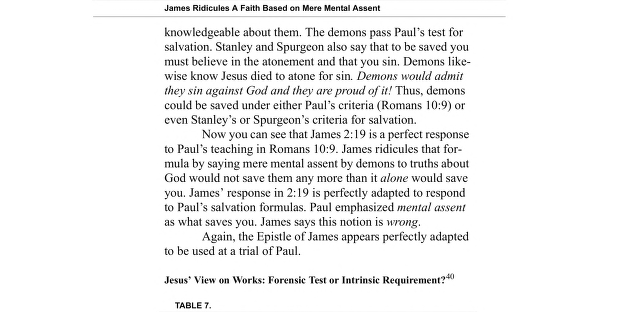Table of Contents
Parent: JesusWordsOnly
James Ridicules A Faith Based on Mere Mental Assent
Paul in (Rom. 10:9) says that part of saving faith is "believing in your heart that God has raised Him from the dead...." The focus in Paul's salvation formula is on acknowledgment of two facts: Jesus is Lord and Jesus resurrected from the dead. However, demons surely know and believe both facts. It thus makes no sense that believing just these facts gives you a guarantee that "you shall be saved" without any repentance and obedience to follow. In modern evangelism, Paul's actual words in his sterile salvation formula in Romans 10:9 are generally ignored. Paul said you were saved if you believed Jesus is Lord and you believed in the fact of the resurrection of Jesus. Modern evangelists such as Stanley and Spurgeon must realize how sterile this salvation formula appears upon reflection. Thus, they change the formula to mean one has saving faith if one is "acknowledging the fact you are a sinner and Jesus paid for your sins." If you accept these facts as true, you are assured that you are "saved."
Yet, that is not Paul's true formula in (Rom. 10:9).
Whether Paul's formula or the Stanley-Spurgeon formula, modern evangelism presents this as a decision that you can do in the privacy of your own heart. You do not have to confess it out loud. Otherwise that would be a works-salvation, modern Paulunists teach. Whether we keep to Paul's for James says that the "demons believe" in God, but they are not thereby saved. James says in 2:19: "Thou believest that God is one; thou doest well: the demons also believe, and shudder." James then goes on to state works are necessary to add to mental assent to make faith complete, as mentioned above. Faith without such works, James relates, is therefore akin to the faith which demons have. It lacks something essential.
38.Stanley, Eternal Security, supra, at 33-35 (trust in Jesus' payment for sin saves you). Spurgeon's The Warrant of Faith (1863) typifies the modern evangelical sermon. He adds an interesting twist that tries to explain away James' point in (Jas. 2:19). Spurgeon does this by making faith in faith alone the act that James seeks beyond mere acknowledgment of facts. At first, Spurgeon appears to agree with James. After giving the Pauline gospel, he says: "The mere knowledge of these facts will not, however, save us...." What then must we dol Spurgeon then says we must trust in Jesus so we always accepts these facts and assure ourselves of salvation by faith alone. Spurgeon required the work of enduring in a faith in faith alone without works. (i.e., belief in the Lordship and resurrection of Jesus) or the modern formula (i.e., belief in your need for Jesus and the atonement), James ridicules that salvation could be acquired by mere mental assent to facts.
James is, in fact, recalling events in the gospels themselves. These events prove mere intellectual acceptance that Jesus is divine or Messiah means nothing if they end up being alone. As Pastor Stedman, an evangelical scholar and Pauline thinker, unwittingly states:
Remember that back in the Gospel accounts there were demons that acknowledged the deity of the Lord Jesus'! When he appeared before them they said, 'We know who you are, the Holy One of God.' (cf, (Mark 1:24), Luke 4:34). They acknowledged what the Jews were too blind to see, the full deity of Jesus Christ, as well as his humanity. But, though demons acknowledged this, they never confessed it.
They never trusted him. They did not commit themselves to him, they did not live by this truth. 39
Pastor Stedman does not realize how this demonstrates Paul's invalidity. Paul said we are saved if we believe in Jesus' resurrection and that Jesus is Lord. ((Rom. 10:9).) The demons not only believe both facts but are personally
- Ray C. Stedman, When Unbelief is Right Demons would admit they sin against God and they are proud of it! Thus, demons could be saved under either Paul's criteria (Rom. 10:9) or even Stanley's or Spurgeon's criteria for salvation.
Now you can see that (Jas. 2:19) is a perfect response to Paul's teaching in (Rom. 10:9). James ridicules that formula by saying mere mental assent by demons to truths about God would not save them any more than it alone would save you. James' response in 2:19 is perfectly adapted to respond to Paul's salvation formulas. Paul emphasized mental assent as what saves you. James says this notion is wrong.
Again, the Epistle of James appears perfectly adapted to be used at a trial of Paul.
Table captionJesus' View on Works: Forensic Test or Intrinsic Requirement ?

